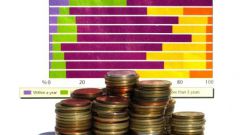Income is defined as the total amount of money coming in the form of wages, interest, dividends, taxes and business profits. In macroeconomic analysis is the aggregate income of the country or national income. In the microeconomic analysis takes into consideration the receipt of funds or goods for a certain period of time. Income is also analysed from the point of view of the purchasing power of a person.
In the history of pre-revolutionary Russia, the income received in the budget, is defined as direct revenues and indirect revenues from regalia and monopolies. Today, the budget revenues consists of budget funds, tax revenues and non-tax revenues. That is, state revenues are made up of foreign trade operations, foreign loans, foreign aid, which is used for the implementation of state functions, payments, duties and taxes. A leading role in the replenishment of the budget play tax revenues.
In Economics the concept of "income" has several classifications.
Employment or earned income is income received for completed work and unearned income – the receipt of rent or of interest over natural resources, or invested elsewhere capital. In the West, this classification is used to determine the tax rate.
Nominal income is income that is received, regardless of changes in prices and taxation and real income is income adjusted, and price changes, and tax deductions.
Gross income is income of the company from the sale of goods and services, property values, interest, which is derived from the provision of money on credit, sale of work performance, revenues and other cash receipts.
Informal activities where the proceeds received, is divided into non-market income and illegal income.
The phrase "net income" is the most widely used and represents the difference between the cost of resources and gross income. Thus, the phrase "net income" has become synonymous with profit.
In the history of pre-revolutionary Russia, the income received in the budget, is defined as direct revenues and indirect revenues from regalia and monopolies. Today, the budget revenues consists of budget funds, tax revenues and non-tax revenues. That is, state revenues are made up of foreign trade operations, foreign loans, foreign aid, which is used for the implementation of state functions, payments, duties and taxes. A leading role in the replenishment of the budget play tax revenues.
In Economics the concept of "income" has several classifications.
Employment or earned income is income received for completed work and unearned income – the receipt of rent or of interest over natural resources, or invested elsewhere capital. In the West, this classification is used to determine the tax rate.
Nominal income is income that is received, regardless of changes in prices and taxation and real income is income adjusted, and price changes, and tax deductions.
Gross income is income of the company from the sale of goods and services, property values, interest, which is derived from the provision of money on credit, sale of work performance, revenues and other cash receipts.
Informal activities where the proceeds received, is divided into non-market income and illegal income.
The phrase "net income" is the most widely used and represents the difference between the cost of resources and gross income. Thus, the phrase "net income" has become synonymous with profit.





